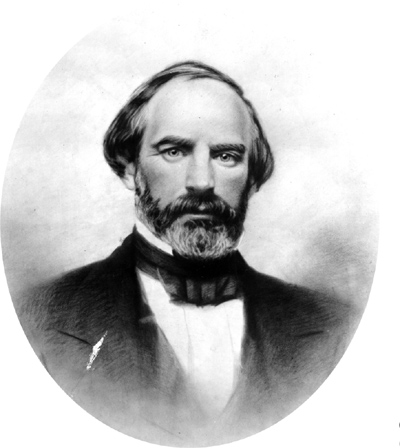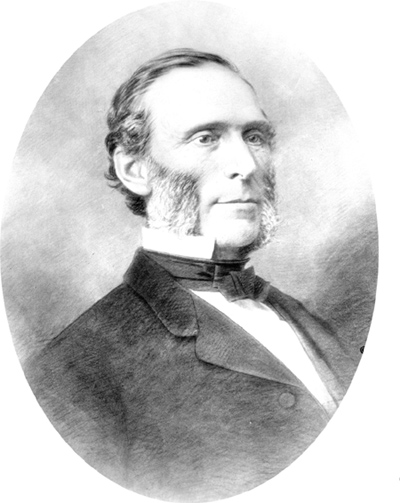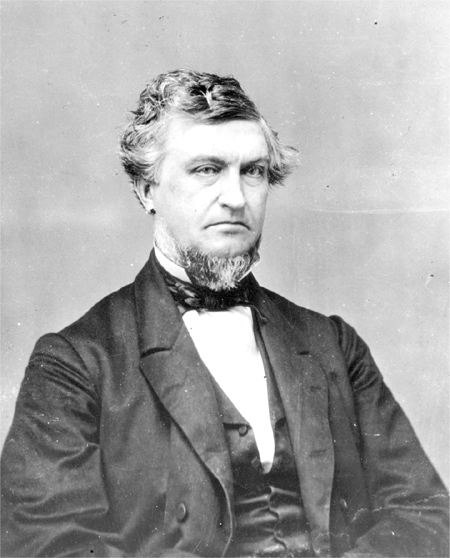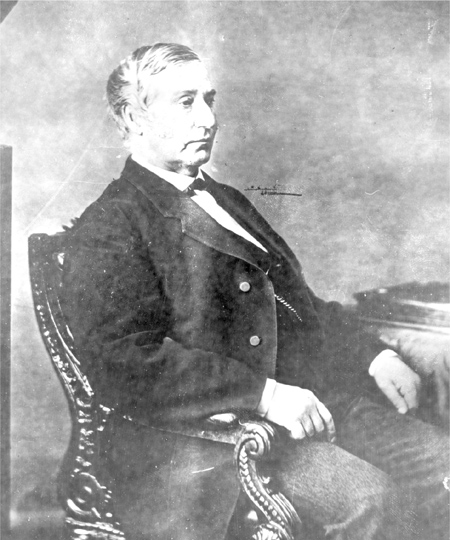
The Civil War as a military conflict was largely staffed by civilians, not professionals. Critical to the North’s success was the machine constructed to mold civilians into troops, train farmers and clerks into soldiers and arm and manage them. The Federal government relied on the states to mobilize and organize raw recruits into a land army that could overcome opposing forces—who were also American. The challenge should not be underestimated. In Michigan, a government apparatus that had ignored its militia before the war rose to the challenge. It was not unheard of even for some politicians to respond by themselves going off to fight.
Henry A. Wise is one better-known example to Civil War students. As antebellum governor of Virginia, he signed John Brown’s death warrant. He served in the Virginia convention on secession and joined the Confederate army upon the withdrawal of Virginia from the Union. Commissioned a general in the Southern army, he was a brigade commander under Lee. Wise made his mark. Less known is a Northern ex-governor who similarly served his state in a military capacity and whose name was not far different.
Moses Wisner was born in New York in 1815. Moving to Michigan to establish a successful law practice, he purchased property in Pontiac in 1844 to construct an elegant home where he and his bride, Angeolina, lived quietly until events on the national stage drew him into political office. Wisner was a staunch Republican and Unionist.
A late nineteenth-century sketch summarized his career:
Governor Moses Wisner (1859–1860).
In politics he was…a Whig of the Henry Clay stamp, but with a decided anti-slavery bias. His practice becoming extensive, he took little part in politics until after the election of Mr. Pierce to the Presidency in 1852, when he took an active part against slavery…On the passage of the Kansas-Nebraska Act of 1854, repealing the Missouri compromise and opening the Territories to slavery, he was among the foremost in Michigan to denounce the shameful scheme. He actively participated in organizing and consolidating the elements opposed to it in that State, and was a member of the popular gathering in Jackson, in July, 1854, which was the first formal Republican Convention held in the United States. At this meeting the name “Republican” was adopted as a designation of the new party consisting of Anti-slavery Whigs, Libertymen, Free Soil Democrats, and all others opposed to the extension of slavery and favorable to its expulsion from the Territories and the District of Columbia…Mr. W. was enthusiastic in the cause and brought to its support all his personal influence and talents. In his views he was bold and radical. He believed from the beginning that the political power of the slaveholders would have to be overthrown before quiet could be secured in this country. In the Presidential canvass of 1856 he supported the Fremont, or Republican ticket…In 1858, he was nominated for Governor of the State by the Republican convention that met at Detroit, and at the subsequent November election was chosen by a very large majority. Before the day of the election he had addressed the people of almost every county and his majority was greater even than that of his popular predecessor, Hon. K.S. Bingham.
His term having expired Jan. 1, 1861, he returned to his home in Pontiac, and to the practice of his profession. There were those in the State who counseled the sending of delegates to the peace conference at Washington, but Mr. W. was opposed to all such temporizing expedients. His counsel was to send no delegate, but to prepare to fight.
After Congress had met and passed the necessary legislation he resolved to take part in the war. In the spring and summer of 1862, he set to work to raise a regiment of infantry, chiefly in Oakland County, where he resided. His regiment, the 22d Michigan, was armed and equipped and ready to march in September, a regiment whose solid qualifications were afterwards proven on many a bloody field. Col. W’s. commission bore the date of Sept 8, 1862…His regiment was sent to Kentucky and quartered at Camp Wallace…But life in camp, so different from the one he had been leading, and his incessant labors, coupled with that impatience which was so natural and so general among the volunteers in the early part of the war, soon made their influence felt upon his health. He was seized with typhoid fever and removed to a private house near Lexington…The malady baffled all medical treatment, and on the 5th day of Jan 1863, he breathed his last. His remains were removed to Michigan and interred in the cemetery in Pontiac, where they rest by the side of the brave Gen. Richardson, who received his mortal wound at the battle of Antietam. Col. W. was no adventurer, although he was doubtless ambitious of military renown and would have striven for it with characteristic energy. He went to the war to defend and uphold the principles he had so much at heart. Few men were more familiar than he with the causes and the underlying principles that led to the contest…He was kind, generous and brave, and like thousands of others he sleeps the sleep of the martyr for his country.158
His valedictory address to the legislature in January 1861 contained this admonition: “This is no time for timid or vacillating councils, when the cry of treason and rebellion is ringing in our ears…Michigan cannot recognize the right of a State to secede from this Union. We believe that the founders of our Government designed it to be perpetual, and we cannot consent to have one star obliterated from our flag.”159
Although Wisner’s life160 and career slid into obscurity, the war governor who occupied center stage for most of the conflict did not. On the east lawn of the capitol grounds in Lansing,161 positioned to look down Michigan Avenue toward the rising sun, stands a statue of Austin Blair.162 It is the only monument of the seven on Capitol Square honoring an individual. The monument was commissioned by the legislature a year after Blair’s death and three decades after the end of the conflict he helped win. One side contains speech selections; on the front is this inscription: “He gave the best years of his life to Michigan and his fame is inseparably linked with the glorious achievements of her citizen soldiers.”

Governor Austin Blair (1861–1864).
Why such an honor? A seminal work on the role of Northern governors suggests it is overblown: “In the long run Lincoln’s victory over the governors was the triumph of a superior intellect…The other governors lacked the clear insight that Lincoln…displayed.” Michigan’s chief executive is last among those named with this summation: “Blair a fanatic lacking in political acumen.”163
Fanatic? In 1848, he refused to support the candidate (Zachary Taylor) of his party (Whig) because neither was sufficiently antislavery, and he attended the more hospitable Free-Soil National Convention at Buffalo. In the state senate, he supported efforts to negate enforcement of the Fugitive Slave Act by voting for a personal liberty law. In 1854, he was a major force behind the meeting “under the Oaks” in his hometown of Jackson from which grew the Republican Party. He also served as a key draftsman on its platform. As a Republican delegate to the Chicago presidential convention in 1860, he supported William Seward of New York over Lincoln, believing the latter too soft on the slavery question.
Lacking political acumen? It was Blair who led the call for a unanimous nomination once Lincoln had enough votes to win:
Michigan, from first to last, has cast her vote for the great Statesman of New York. She has nothing to take back. She has not sent me forward to worship the rising sun, but she has put me forward to say that, at your behest here to-day, she lays down her first, best loved candidate to take up yours, with some beating of the heart, with some quivering in the veins (much applause)…We martial now behind him in the grand column which shall go out to battle for Lincoln.164
As leader of his party in the state, Blair needed to turn out the vote for Lincoln in November. It was not close: 57 percent for Lincoln165 to 42 percent for Douglas, with a paltry 1,220 votes for Breckinridge and Bell combined. The outcome put the state’s 6 electoral votes in Lincoln’s column and carried him over the 152 needed. Four years earlier, Fremont had the votes of much of southern lower Michigan except for Wayne County and Detroit. Blair carried that territory for Lincoln and more of the Lower Peninsula.
As governor, Blair offered military support to the president from the start. Before Lincoln uttered a word officially as commander in chief, Blair’s January 1861 inaugural address pledged unqualified aid:
Secession is revolution, and revolution in the overt act is treason, and must be treated as such…I recommend you at an early day to make manifest to the gentlemen who represent this State in the two Houses of Congress, and to the country, that Michigan is loyal to the Union, the Constitution, and the laws, and will defend them to the uttermost; and to proffer to the President of the United States the whole military power of the State for that purpose…let us abide in the faith of our fathers - “Liberty and Union, one and inseparable, now and forever.”166
A year later, he led an effort calling upon Congress to increase pressure for prisoner exchanges—having in mind the return of the imprisoned colonel of the First Michigan Infantry. When midterm elections arrived in November 1862, the war was far from won. Democrats made comebacks in many states, but not in Michigan, where Blair’s party remained strong as evidenced in this headline: “Michigan Elects the Republican State Ticket, 5 Republican Congressmen and One Democratic member, and a Republican Legislature.”167
Some states saw a reversal of political power amid debate about issuance of the preliminary Emancipation Proclamation in September—Illinois, Lincoln’s home state, included. Blair unequivocally celebrated the decision, having urged the administration to “confiscate contrabands” as early as January 1862. Since the antislavery efforts he had long sought were finally being employed, in 1864, he helped stem an insurgency within the party that threatened Lincoln’s renomination. On February 4, he approved one resolution that recommended the president’s reelection and one reaffirming Michigan’s “unalterable attachment to the Government, the Constitution and the Union, and its undying hostility to the rebellion” with support of the national government to bring the war to a successful end. Blair also helped secure the ability of soldiers to vote in the coming national canvass.
The November 1864 election could have elevated Democrat George McClellan to the presidency, a result, in Lincoln’s view, that would make winning the war impossible. The Michigan electorate faced a choice in the fall: reelect Lincoln and continue the current policy or opt for a different approach. Despite over three years of disheartening progress in the East and cognizant of the great strides made in the West, Michigan turned out for Lincoln again under Blair’s leadership, casting 55.1 percent (91,133) of its vote to give him a second term (McClellan pulled 74,146). The state’s electoral votes again went into the Republican column, and a Republican governor would take office again on January 1, 1865.168
With the war nearly won, Blair stepped down in 1864. He went on to serve three terms in Congress, during which he voted for the impeachment of Andrew Johnson. The speaker of the House of Representatives adjudged his service during this phase of his career:
He exhibited talent in debate, was distinguished for industry in the work of the House and for inflexible integrity in all his duties. He was not a party man in the ordinary sense of the word, but was inclined rather to independence in thought and action. This habit separated him from many friends who had wished to promote his political ambition, and estranged him for a time from the Republican party. But it never lost him confidence of his neighbors and friends, and did not impair the good reputation he had earned in his public career.169
Blair had acted vigorously as the civilian commander in a mobilization of fully one-quarter of the state’s male population.170 When the War Department told him to cease recruiting activity since more troops were not needed, Blair ignored the injunction and kept on organizing regiments that, after all, were accepted into U.S. service when the need became obvious. He left office poorer than when entering it, for much of his personal funds were contributed to the war effort. His obituary in the New York Times summarized him: “famous as the loyal War governor of Michigan,” the “Michigan Legislature, under his leadership, declared adherence to the government,” after which he sent tens of thousands of Michiganders “to the field.”171
His Republican successor, Henry H. Crapo of Flint, had supported the war effort as a legislator. Crapo managed the state through the final months of the war and into Reconstruction until 1869. Upon taking the governor’s office, he centered his remarks on the tens of thousands of Michiganders in uniform:
Governor Henry H. Crapo (1865–1868).
This is indeed a fearful sacrifice to be made even in the cause of liberty, justice, and humanity, and fearful is the penalty and terrible is the suffering which the authors and leaders of treason and rebellion deserve and must endure as a just consequence of this enormous crime. These brave men—the Michigan troops—are worthy of all praise.172
On June 14, 1865, he issued a “Welcome to Returning Troops” consistent with his inaugural:
Michigan Soldiers—Officers and Men:
In the hour of National danger and peril, when the safety—when the very existence—of your country was imperiled, you left your firesides, your homes and your families, to defend the Government and the Union. But the danger is now averted, the struggle is ended, and victory—absolute and complete victory—has perched upon your banners. You have conquered a glorious peace, and are thereby permitted to return to your homes and to the pursuits of tranquil industry, to which I now welcome you! And not only for myself, but for the people of the State, do I tender you a most cordial greeting.
In the name of the people of Michigan, I thank you for the honor you have done us by your valor, your soldierly bearing, your invincible courage, everywhere displayed, whether upon the field of battle, in the perilous assault, or in the deadly breach; for your patience under the fatigues and privations and sufferings incident to war, and for your discipline and ready obedience to the orders of your superiors. We are proud in believing that when the history of this rebellion shall have been written, where all have done well, none will stand higher on the roll of fame than the officers and soldiers sent to the field from the loyal and patriotic State of Michigan.173
A year later, he performed a similar ceremonial role in accepting battle flags from Michigan’s returned regiments.174
Zachariah Chandler was no mere ceremonial figure. The fire-eating Michigander’s significance was, until recently, represented as one of the two Michigan monuments in Statuary Hall in the U.S. Capitol. He was mayor of Detroit before his election to the U.S. Senate in 1857, a strategist for and product of the Republican ascendancy in the state. He remained in that body until 1875, leaving to become secretary of the interior in the Grant administration. He also served as chairman of the Republican National Committee from 1868 to 1876.
Chandler cut a sharp political silhouette.175 His election to the Senate “was due in no small degree to the belief of his constituents that in him they had found a man who would stand his ground, refuse concessions and demand recognition for the claims of the Northwest.”176 In response to the hanging of John Brown—a result he did not decry but turned to advantage—he fired a shot across the bow of the South: “I want it to go upon the records of the Senate in the most solemn manner and to be held up as a warning to traitors, come they from the North, South, East or West—dare to raise your impious hands against this Government, against our Constitution and our laws and you hang.”177

U.S. senator Zachariah Chandler.
When the so-called Peace Convention met to avert civil conflict in early 1861, Chandler led the Michigan congressional delegation in opposing concessions and compromises. He voted in opposition to the proposed Thirteenth Amendment that would have confirmed slaveholding rights.
Chandler “was unabashed in any mortal presence.”178 In a scene somewhat reminiscent of the 1856 incident where South Carolina’s Preston Brooks attacked Charles Sumner of Massachusetts at his desk in the Capitol—but where he gave as good as he got—Chandler fought two South-sympathizing members of Congress from Indiana at the National Hotel in Washington. The donnybrook made him no less popular back home:
In his own State he found himself in thorough rapport with the people. Particularly in the country districts men, women and children came five, ten and even twenty miles to hear him, and it was no unusual thing, particularly in the new counties in the northwestern part of the State, for stores to close, sawmills to shut down, farm labor to be suspended and almost the whole population to turn out to the Republican meetings.179
They were rewarded with stem-winding speeches that called for abolition of slavery and direct confrontation with the slaveholding power.
Chandler and Lincoln, though of the same party, differed on the slavery question. Lincoln wanted to contain it; Chandler wanted to eliminate it. Lincoln favored gradualism; Chandler favored immediacy. As early as the summer of 1861, Chandler was one of three leading senators pressing Lincoln to take steps toward a harsh war and emancipation.180 Both favored a victorious conduct of the war, but Chandler was one of the major movers behind creation of a joint investigatory committee to hold accountable the administration, the military and those in supporting roles. On “every proposition to sustain the Administration with money and men he voted ‘yea.’”181 History calls him a “radical Republican,” and when it came to prosecuting the war with utmost vigor, such a term was apt. He brooked no talk of easing up on the Rebels, as revealed in this example during debate on a resolution calling for retaliation for mistreatment of Union prisoners:
The Senator from Indiana objects to another statement that I made, which was that these Rebels are “hellish” or something to that effect. On reflection I think I have done an injustice, and no man is more ready to apologize for an injustice done than I am; but when I apologize for that remark it will not be to the rebels, but to the inhabitants of hell.182
Notwithstanding his differences with Lincoln, Chandler worked in the 1864 presidential campaign to persuade John C. Fremont, the candidate of 1856, not to mount an intraparty fight for the nomination. Even though Lincoln had killed the Wade-Davis bill for Southern Reconstruction, which Chandler had supported, the senior senator from Michigan put the dispute aside.
Chandler induced Fremont to withdraw from the contest and secured the support of [Benjamin] Wade and [Henry] Davis for Mr. Lincoln. There is every reason to believe that Mr. Chandler’s influence was potent in healing the breach in the Republican ranks.183
Chandler’s death in 1879 snuffed out a budding presidential candidacy. His legacy would be in a Senate career where he vigorously fought the “Slavocracy” and prodded the Lincoln administration to do the same.
The junior senator from Michigan during the war had, in common with his senior, an abiding hatred for slavery. Jacob M. Howard’s style, however, was quite different. Soon after moving to Detroit from Massachusetts and securing a law license, he became Detroit city attorney and then a member of the state legislature. In 1854, he, too, was a key driver behind the formation of the Republican Party in Jackson and helped draw up its platform.184 Howard was elected attorney general of Michigan and, in 1861, filled the unexpired term of the late Kingsley S. Bingham in the U.S. Senate. It was a substitution that would have far-reaching consequences.

U.S. senator Jacob Howard.
Bingham was the first Republican governor of Michigan and a staunch supporter of its antislavery platform. It was Howard, though, who would do more in the Senate to eradicate slavery than his predecessor. Jacob Howard was “a scholarly man, a polished orator, an excellent constitutional lawyer and a highly respected citizen.”185 And he was a key supporter of the bill that became the Thirteenth Amendment to the Constitution, abolishing slavery: “I, for one, regard it as of the utmost importance not only to us but to our country and our posterity.”186
Howard defended its simplicity and straightforwardness against all attempts that would complicate its meaning. In doing so, he relied on the formative document for Michigan’s existence:
I wish as much as the Senator from Massachusetts [Sumner] in making this amendment to use significant language, language that can not be mistaken or misunderstood; but I prefer to dismiss all references to French constitutions or French codes, and go back to the good old Anglo-Saxon language employed by our fathers in the ordinance of 1787, an expression, which has been adjudicated upon repeatedly, which is perfectly understood both by the people and by judicial tribunals, a phrase, I may say further, which is peculiarly near and dear to the people of the Northwestern territory, from whose soil slavery was excluded by it. I think it is well understood, well comprehended by the people of the United States, and that no court of justice, no magistrate, no person, old or young, can misapprehend the meaning and effect of that clear, brief, and comprehensive clause.187
That clause was ultimately adopted, containing simple words that constitutionally eliminated the underlying cause of the war: “Neither slavery nor involuntary servitude, except as a punishment for crime whereof the party shall have been duly convicted, shall exist within the United States, or any place subject to their jurisdiction.” Both he and Chandler voted for it, and their state became the third to ratify it.
Howard was not done. A year after the war’s military end, on June 13, 1866, Congress proposed the Fourteenth Amendment to the Constitution, guaranteeing citizenship to African Americans. The senator from Michigan was the floor manager of the measure in the upper chamber.188
Jacob Howard was a war hawk. When the question of elevating U.S. Grant to lieutenant general arose, he was completely supportive because of Grant’s style and success: “Give us, sir, a live general…who will…give us victory.”189 He was a chief architect of the bill to provide for retaliation against Confederate mistreatment of Union prisoners. He may not have sounded like his colleague Chandler but in accomplishment was no junior.
Michigan’s highest level of political leadership during the Civil War exhibited a number of common traits. They were pro-Union, prohard war, antislavery. They were looked at as radicals, and they did not shrink from the title. Soldiers had their support; slaves had their sympathy. These five had the courage of their convictions, and they led Michigan to victory.